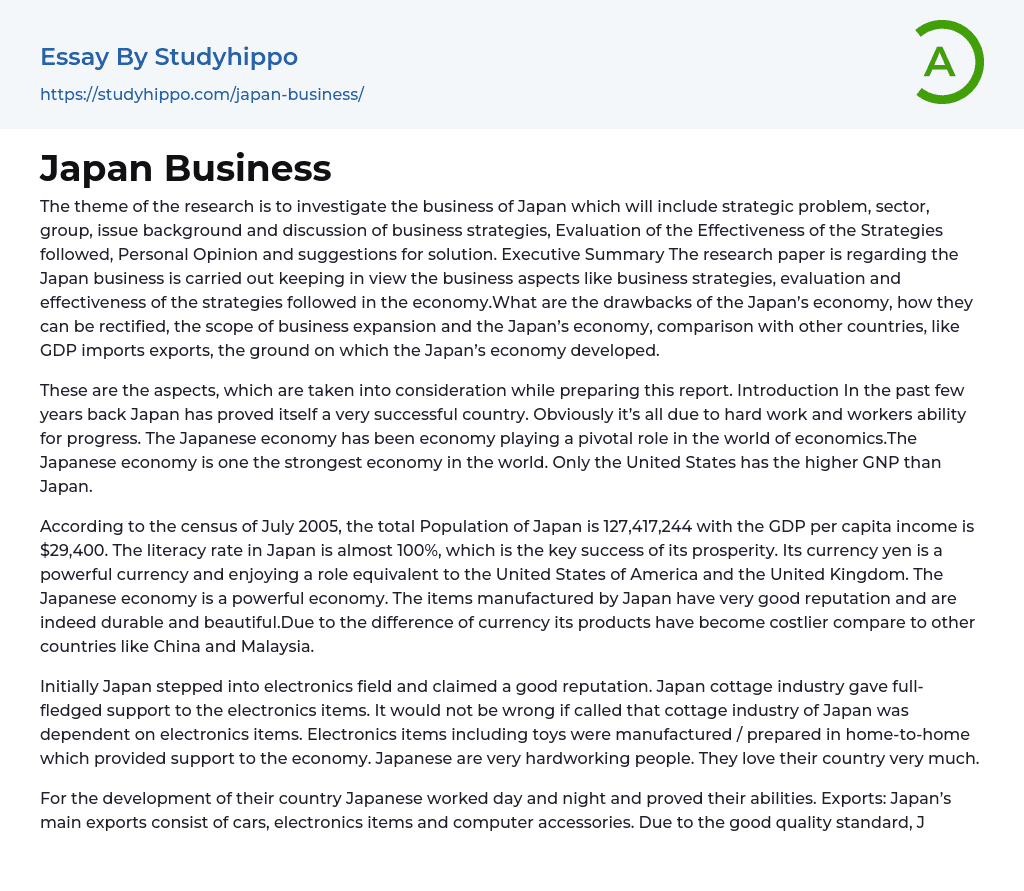The purpose of this study is to investigate various aspects of Japan's business, including strategic challenges, sectors, groups and issues. The analysis will involve a thorough examination of business strategies and their effectiveness, providing individual viewpoints and remedies. Specifically, the executive summary will concentrate on assessing Japan's business strategies and highlighting deficiencies in its economy while offering possible solutions to tackle them. Furthermore, the report will explore prospects for expanding businesses within Japan's economy as well as compare its GDP, imports and exports with other nations. Finally, an inquiry into Japan's economic growth will also be undertaken.
Various elements were taken into account in the production of this report. A crucial aspect pertains to Japan's recent accomplishments, which are attributable to the diligent and forward-thinking nature of its workforce. Furthermore, Japan occupie
...s a prominent spot in the worldwide economy as one of the most robust economies globally. It is significant to note that Japan's Gross National Product (GNP) is ranked second globally, trailing only behind that of the United States.
Japan's population was 127,417,244 as of July 2005 and its GDP per capita income was $29,400. The country's near-perfect literacy rate has been integral to its success. Japan uses yen as currency which holds strong value compared to the United States and the United Kingdom. It is renowned for producing high-quality goods with long-lasting effects, contributing to a robust economy. Nevertheless, due to fluctuations in currency values, Japanese products have become pricier than those made by countries such as China and Malaysia.
Japan's cottage industry started out strong by producing electronic toys, which helped establish the country's reputation in the electronics sector and contributed to its economy. Overall,
Japan's cottage industry centered around manufacturing electronic products, while also benefitting from the hard work and patriotism of its citizens.
Japan's dedication to progressing their nation is apparent through their main exports, comprising of cars, electronics and computer accessories. The United States stands as Japan's most substantial trading partner, importing more than 25% of all Japanese exports due to Japan's exceptional quality standards. Additionally, China, Singapore, South Korea, Taiwan and Hong Kong are significant export destinations for Japan. To achieve a balance between importing and exporting while manufacturing these products, Japan imports raw materials like oil, foodstuffs and wood.
Japan's economy is reliant on a variety of industries, including manufacturing, construction, distribution, real estate, services, and communication. The country heavily depends on major imports from China, the United States, Australia, Indonesia and South Korea. While agriculture only contributes 2% to Japan's national GNP, rice remains its most crucial crop. In contrast to this industry, mining in Japan is relatively small and has little impact on the country's economic progress. For detailed statistics on Japan's economy please refer to Appendix A. It is worth noting that Japan achieved its current economic status through various aspects such as business strategies like Total Quality Management (TQM), as mentioned by J.
According to renowned Quality Expert, M. Juran, Total Quality Management (TQM) is essential to the management processes and systems that generate contented customers via empowered employees, resulting in increased revenue and reduced cost. Japan mandates strict quality control measures for all manufactured products through the amalgamation of organizational functions and processes aimed at achieving consistently superior quality of goods and services. The ultimate objective should be customer gratification with zero grievances.
Ensuring customer satisfaction is essential in international markets, emphasizing the importance of providing quality care. Despite a slightly higher price, customers will choose products that offer good quality. Durability is also critical for meeting customer needs. Effective leadership, which includes maintaining a positive attitude and top management involvement to address any issues that arise, is a significant contributor to Japan's economic success.
Effective communication and coordination are crucial for achieving success in business, as proven by Japan's successful economy. The country implemented a management system that promoted competitiveness and global expansion through strategic information systems, improved accounting practices, and advanced processes/systems that fostered consistent communication and information sharing between suppliers and customers. Furthermore, the significance of human resources was acknowledged in attaining economic prosperity.
In any economy or organization, human resources hold utmost significance, as they play a crucial role. When utilized to their fullest potential, they can create wonders. Training is an essential tool that aids in refining the abilities and talents of the human resource. Adequate training can lead to a favorable outcome. Japan follows the same principle.
Japanese economists and businessmen understood that selecting suitable human resources and having a performance appraisal and compensation system is crucial for the success of the business and economy.
- Accounting essays
- Marketing essays
- Automation essays
- Business Cycle essays
- Business Model essays
- Business Operations essays
- Business Software essays
- Corporate Social Responsibility essays
- Infrastructure essays
- Logistics essays
- Manufacturing essays
- Multinational Corporation essays
- Richard Branson essays
- Small Business essays
- Cooperative essays
- Family Business essays
- Human Resource Management essays
- Sales essays
- Market essays
- Online Shopping essays
- Selling essays
- Strategy essays
- Management essays
- Franchising essays
- Quality Assurance essays
- Business Intelligence essays
- Corporation essays
- Stock essays
- Shopping Mall essays
- Harvard Business School essays
- Harvard university essays
- Trade Union essays
- Cooperation essays
- News Media essays
- Waste essays
- Andrew Carnegie essays
- Inventory essays
- Customer Relationship Management essays
- Structure essays
- Starting a Business essays
- Accounts Receivable essays
- Auditor's Report essays
- Balance Sheet essays
- Costs essays
- Financial Audit essays
- International Financial Reporting Standards essays
- Tax essays
- Accountability essays
- Cash essays
- Principal essays




